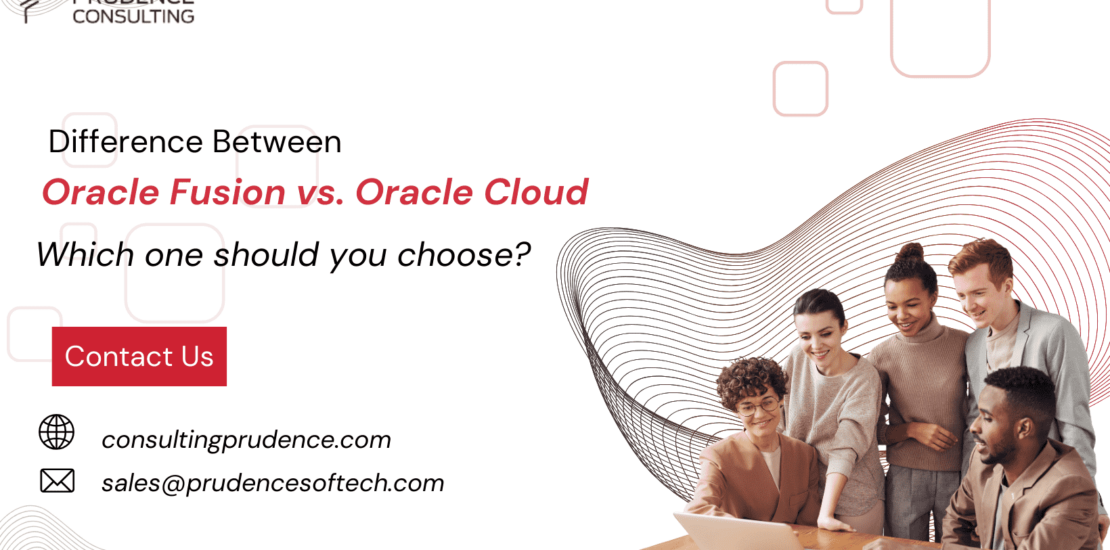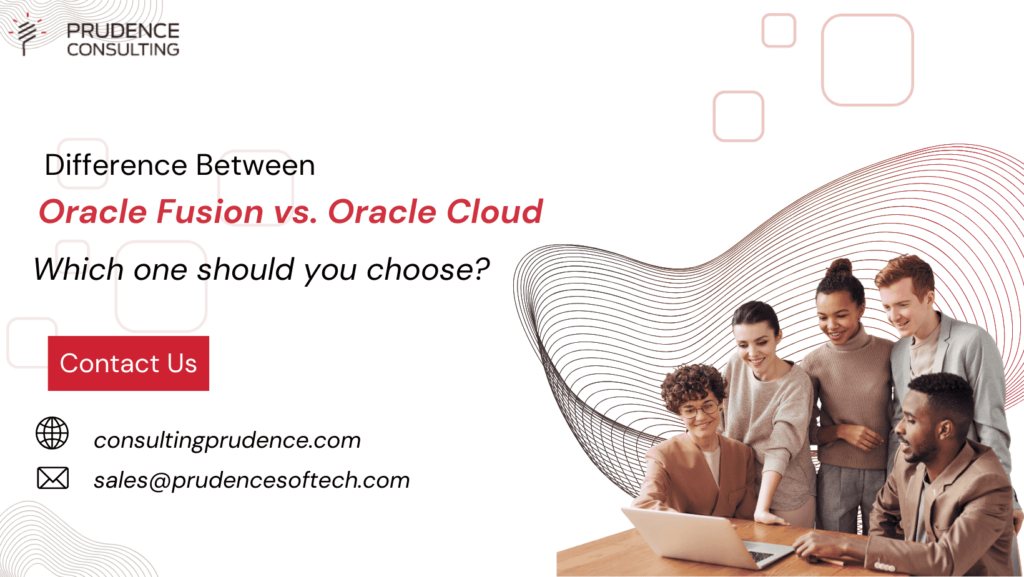Oracle Fusion vs. Oracle Cloud
-
November 1, 2023
- Posted by: piyush.gupta@prudencesoftech.in
- Category: Oracle EBS
No Comments

- November 1, 2023
- Posted by: piyush.gupta@prudencesoftech.in
- Category: Oracle EBS


In the world of modern business, staying competitive often comes down to the smart use of technology. When it comes to database management and cloud services, two giants stand out: Oracle Fusion and Oracle Cloud. These two robust platforms are engineered to supercharge your business operations, yet each comes with its unique set of capabilities and features. In this blog, we will take you on a journey through the realms of Oracle Fusion and Oracle Cloud to help you decide which one aligns best with your organization’s needs.
Oracle Fusion: The Symphony of Integration
Oracle Fusion is like a well-composed symphony, bringing together different instruments (applications) to create a harmonious whole. It is an integrated suite of applications that covers everything from enterprise resource planning (ERP) and human capital management (HCM) to customer experience (CX) and supply chain management. Think of it as the conductor ensuring that all elements of your business work in unison.
- Unified Data: Oracle Fusion centralizes data management, breaking down silos and allowing for a 360-degree view of your organization. It means your HR, finance, sales, and other departments can speak the same language and make well-informed decisions.
- Real-time Analytics: With Oracle Fusion, you can access real-time analytics, enabling you to make data-driven decisions on the fly. Whether it’s forecasting, demand planning, or financial reporting, you have the power of data at your fingertips.
- Scalability and Customization: Oracle Fusion can be tailored to fit your unique business needs. It adapts as your organization grows, offering scalability that ensures you won’t outgrow your system.
Oracle Cloud: The Infinite Sky of Possibilities
Oracle Cloud, on the other hand, is like an endless sky full of possibilities. It’s a cloud infrastructure that provides a range of cloud computing services, including computing, storage, and databases. It’s all about maximizing the potential of your data, without the constraints of on-premises hardware.
- Cost Efficiency: Moving to the cloud can often lead to cost savings as it eliminates the need for extensive physical hardware and maintenance. Oracle Cloud offers a pay-as-you-go model, ensuring you only pay for what you use.
- Flexibility: Oracle Cloud offers a range of cloud services, allowing you to choose precisely what fits your needs. Whether you require infrastructure as a service (IaaS), platform as a service (PaaS), or software as a service (SaaS), Oracle Cloud has you covered.
- Enhanced Security: Oracle Cloud is committed to robust security practices. Your data is protected with state-of-the-art security measures, giving you peace of mind.
Oracle Fusion vs. Oracle Cloud: The Sweet Spot
So, which one should you choose? The answer may lie in a hybrid approach. Many businesses find the sweet spot by combining the strengths of Oracle Fusion and Oracle Cloud. Oracle Fusion for comprehensive data integration and real-time analytics, and Oracle Cloud for cost efficiency, flexibility, and scalability.
The key is to assess your organization’s specific requirements and long-term goals. Oracle Fusion and Oracle Cloud are both powerful tools, and your decision should be guided by what will best empower your business in the evolving landscape of technology and data management.
Also Read: ERP Implementation & Support
Conclusion:
In conclusion, whether you opt for the symphony of Oracle Fusion or the limitless possibilities of Oracle Cloud, what’s most important is that you embrace technology as a means to unlock your business’s full potential. Technology is the conductor of the modern business orchestra, and your success will be its sweetest melody.
Also Read: ERP for telecommunication


